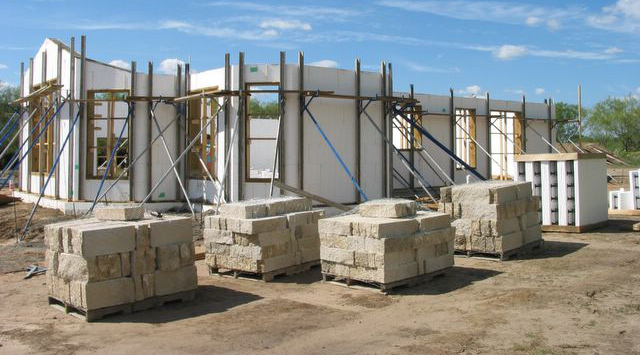New Construction Design
We assist in designing GREEN homes!
Basic recommendations for building a "GREEN" home:
ICF Block:
 We strongly favor ICF block and build with it all the way to the roof for many reasons:
We strongly favor ICF block and build with it all the way to the roof for many reasons:
1) Strength
Its structural strength arises from monolithic concrete poured into forms into which steel rebar has been placed per engineering specification. An ICF house can be designed to withstand hurricanes, tornadoes or allow a helicopter to land on the roof.
2) Inorganic
While termites can tunnel through foam and even crawl through minute cracks in concrete, there is nothing organic (cellulosic) in an ICF wall to attract, feed or sustain insects or mold
3) Sound suppression
ICF walls help isolate homeowners from sound and vibration arising from proximity to airports, roads and busy waterways
4) Thermal mass
The large quantity of concrete encapsulated in insulating foam contributes a thermal "flywheel" effect, isolating the interior for many hours from late night low temps in winter or afternoon highs in summer, allowing the heating and cooling system to be designed for average rather than peak highs and lows for the day.
Insulation:
 Insulation is normally specified in R-value (R meaning Resistance to heat flow), but that only tells part of the story. It is also necessary to ensure the building envelope minimize air leakage.
Insulation is normally specified in R-value (R meaning Resistance to heat flow), but that only tells part of the story. It is also necessary to ensure the building envelope minimize air leakage.
Conventional batt or fill insulations do little or nothing to stop air movement though them, so warm house air escapes and cold outdoor air comes in–vice versa. Foam insulation (CORRECTLY APPLIED) provides both high R-value and a tight air seal.
That's not to say that conventional insulation materials can't be correctly installed to provide the designed result, but they require additional air sealing details to properly perform.
HVAC System:
 The best Btu, watt or ton is the one not needed, bought, installed, or operated. In other words, invest in a building envelope designed to minimize heating and cooling load. That said, choosing HVAC systems depends very much on availability and unit costs of local fuels – electricity, natural gas, fuel oil, propane, and possibly also firewood, coal or other pelletized solid fuels.
The best Btu, watt or ton is the one not needed, bought, installed, or operated. In other words, invest in a building envelope designed to minimize heating and cooling load. That said, choosing HVAC systems depends very much on availability and unit costs of local fuels – electricity, natural gas, fuel oil, propane, and possibly also firewood, coal or other pelletized solid fuels.
Geothermal systems tend to have the highest installation costs but lowest operating costs. On the other hand, if natural gas is available then chances are good it offers both reasonable operating cost and low installation cost. The payback period for the premium cost of geo will be quite a bit longer if natural gas is available.
However, if the only available fossil heating fuels are heating oil or propane, geo is likely to pay back much faster since costs per delivered Btu are much higher for oil and propane than for natural gas.


